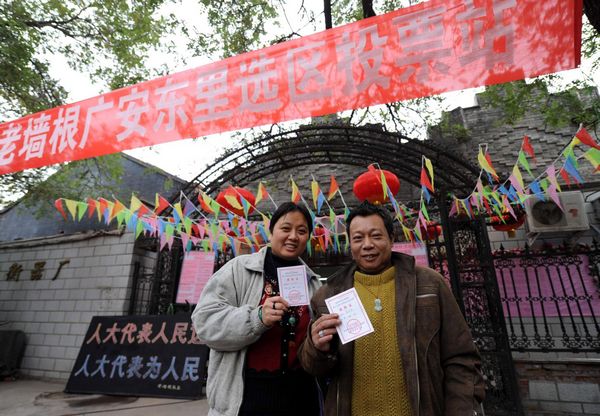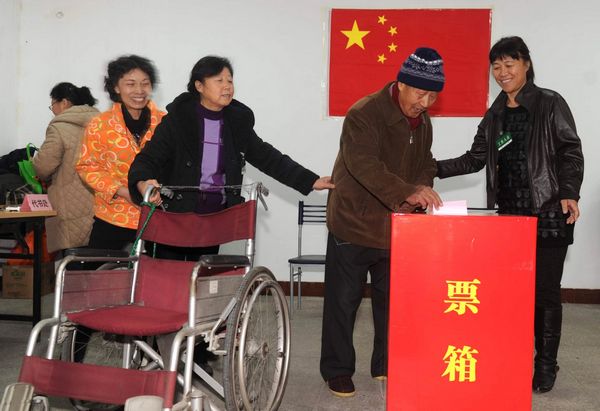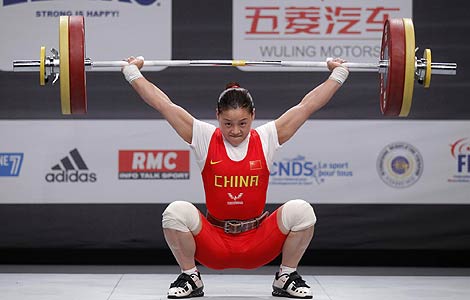China's local legislative election begins
Updated: 2011-11-09 07:40
By Zhao Yinan (China Daily)
|
|||||||||
BEIJING - More than 9 million voters in Beijing cast their ballot to elect about 15,000 new lawmakers at grassroots levels on Tuesday.
 |
|
Sun Donghua (L) and Li Longquan prepare to cast their ballots during an election of local people's congress deputies in Beijing on Nov 8, 2011.[Photo/Xinhua] |
The deputies, after being elected, will vote for the new lineup of local governments at grassroots legislature's plenary session, to be held in December.
"The polling started as early as five in the morning in our village, since most villagers are accustomed to getting up early," said Fu Xin, Party secretary of Xifa village, Tongzhou district.
At Financial Street in downtown Beijing, the election lasted till midnight.
"A major part of voters in our neighborhood are company employees, and we run the polling station till zero hour so that they can vote after work," Liu Shuo, an official with Beijing's Financial Street electoral commission said.
President Hu Jintao, former president Jiang Zemin, as well as members of the Standing Committee of the Political Bureau of the Communist Party of China (CPC) Central Committee, also cast their ballots at a voting booth in Beijing to elect new deputies for the local people's congress in their district, or entrusted others to vote on their behalf.
Ballot counting started at each electoral district, as soon as voting was completed, and the final result will be published by the middle of November, according to Beijing Electoral Commission.
Xiang Yiran, a high school student in Beijing who just turned 18, cast her ballot along with other 34 fellow students at a voting booth at Chongwenmen on Tuesday afternoon.
"I had some basic ideas about elections in politics class, and it's good to have some personal experience today," she said.
"The voting was quick, and it was not as grand as I had expected. But I felt like an adult when I put in the ballot paper," she said. Xiang and her friends took a picture in front of the voting booth to commemorate their first ever participation in the electoral process.
 |
|
Ni Baoshu, 87, casts his ballot in Beijing on Tuesday.[Photo/Xinhua] |
The ongoing election is the first since the Electoral Law was revised in 2010, which requires the ratio of deputies in rural and urban areas to be the same as that of their respective populations, part of the country's efforts to narrow down the urban-rural gap by ensuring both segments of society have the same voting rights.
He Yehui, deputy secretary-general of the National People's Congress Standing Committee, said 12 out of the 31 provincial-level regions - all but Taiwan, Hong Kong and Macao - will wrap up the election by the end of this year, while the other 19 will finish the work next year.
Although the law stipulates ballot boxes to be a requisite at each voting booth to ensure voters can write the ballots secretly, not all voters ask for such privacy.
Guo Yuying, who oversaw the poll proceedings at Chongwenmen, said most of the voters didn't use the ballot box.
"But there are some who insist on absolute privacy, and we have to persuade others to walk away from them," Guo said.
The grassroots election, held every five years, is the lowest and only level of China's electoral process where direct elections are allowed.
More than 900 million voters at the county level and more than 600 million voters at the township level will cast their ballots by the end of next year, according to the National People's Congress.
The election will also see more than 2 million deputies elected at more than 2,000 county-level people's congresses and more than 30,000 township-level ones, the top legislature said.











